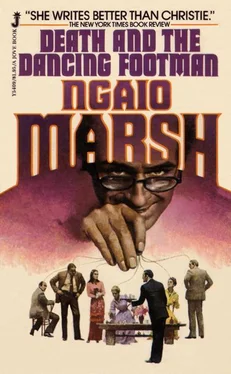Ngaio Marsh - Death And The Dancing Footman
Здесь есть возможность читать онлайн «Ngaio Marsh - Death And The Dancing Footman» — ознакомительный отрывок электронной книги совершенно бесплатно, а после прочтения отрывка купить полную версию. В некоторых случаях можно слушать аудио, скачать через торрент в формате fb2 и присутствует краткое содержание. Жанр: Классический детектив, на английском языке. Описание произведения, (предисловие) а так же отзывы посетителей доступны на портале библиотеки ЛибКат.
- Название:Death And The Dancing Footman
- Автор:
- Жанр:
- Год:неизвестен
- ISBN:нет данных
- Рейтинг книги:4 / 5. Голосов: 1
-
Избранное:Добавить в избранное
- Отзывы:
-
Ваша оценка:
- 80
- 1
- 2
- 3
- 4
- 5
Death And The Dancing Footman: краткое содержание, описание и аннотация
Предлагаем к чтению аннотацию, описание, краткое содержание или предисловие (зависит от того, что написал сам автор книги «Death And The Dancing Footman»). Если вы не нашли необходимую информацию о книге — напишите в комментариях, мы постараемся отыскать её.
Death And The Dancing Footman — читать онлайн ознакомительный отрывок
Ниже представлен текст книги, разбитый по страницам. Система сохранения места последней прочитанной страницы, позволяет с удобством читать онлайн бесплатно книгу «Death And The Dancing Footman», без необходимости каждый раз заново искать на чём Вы остановились. Поставьте закладку, и сможете в любой момент перейти на страницу, на которой закончили чтение.
Интервал:
Закладка:
While he still stared at her they both heard the sound of a car coming slowly up the last curve of the drive.
Chapter XIII
Examination
Alleyn went alone to the smoking-room. On their arrival Mandrake had gone at once to find Jonathan and had returned to say he would be down in a minute or two. “And in the meantime,” Mandrake said, “I am deputed to show you anything you want to see. I suppose — I mean, I’ve got the keys…” Alleyn thanked him, took the keys, and let himself into the smoking-room. He drew back the curtains from the windows and a very cold light discovered the body of William Compline. The greenstone blade lay on the floor about two feet from William’s left shoe. The striking edge was stained. There was a short thong around the narrow grip. Alleyn had seen Maori meres in New Zealand museums and had reflected on the deadly efficiency of this beautifully shaped and balanced weapon. “The nearest thing,” he murmured as he bent over it, “to the deadly Gurkha kukri that is possible in stone, and that only in the extremely hard and tough New Zealand greenstone. Unless this expert is a lunatic there’ll be no prints, of course.” He looked very closely at the wireless. It was an all-wave instrument made by a famous firm. There were five bakelite control knobs under the dial. From left to right the knobs were marked Brilliance, Bass, Tuner, Wave-band and Volume. The screws that attached them were sunk in small holes. The tuner control, placed above the others, was formed by a large quick-turning knob from the centre of which a smaller knob, for more delicate tuning, projected. The main switch was on the side facing the “boudoir” door. Alleyn noted the position of the tuning indicator and reflected that if a time check was needed he could get one from the B.B.C. He turned from the wireless to a writing-desk that stood against the same wall, between two windows. Above this desk was hung an array of weapons, a Malay kris, a boomerang, a Chinese dagger, and a Javanese knife; the fruits, thought Alleyn, of some Royal tour through the East to Oceania. An empty space on the extreme left of the group suggested the position of the mere and an unfaded patch on the wall gave a clear trace of its shape. It had been in full view of William as he sat fiddling with the radio control. This conjured up a curious picture. Was William so absorbed in the radio that he did not notice his assailant take the weapon from its place on the wall? That was scarcely credible. Had his assailant removed the weapon some time previously? Or did William notice the removal and see no cause for alarm? In that case the assailant could surely not have been Hart since William’s antagonism to Hart was so acute that it was impossible to imagine him regarding such a move with anything but the deepest suspicion. Had Hart, then, previously removed the mere ? But when? Before Mandrake spoke to him in the “boudoir”? Not afterwards, because William was there with Nicholas, who locked the communicating door in his face. Again he looked from the volume control to the space on the wall and wondered suddenly if Hart’s ignorance of radio could possibly be assumed. But suppose Hart removed the mere ? He had not been present at dinner. Had he taken it while the others were dining? Alleyn turned from the wall to the desk, a small affair with two drawers, one of which was not quite closed. He opened it with his finger-nail. Inside were a number of small pads. “Charter forms, by gum,” Alleyn muttered.
He had brought with him the parcel ordered by telephone from the chemist. He opened it and transferred the contents to his own attaché-case. Among them were two pairs of tweezers. With these he took the Charter pads, one by one, from the drawer and laid them out on the desk. There were nine, and most of them were complete with their own small pencils. At the back of the drawer he found a number of India-rubbers.
“A little dreary labour,” he thought, “should no doubt be expended. Later, perhaps.” And taking great pains not to touch the pads, he transferred them, together with the pencils and India-rubbers, to an empty stationery box he found in another drawer. This he placed in his attaché-case. He then moved on from the desk toward the library door. A four-fold red leather screen stood in front of the library door. It almost touched the outside wall and extended, at an angle, some five or six feet out into the room. Alleyn went round it and faced the door itself, which was in the corner of the room. The door-knob was on his right. He unlocked it, glanced into the library, and shut it again. As he stooped to the lock he noticed a small hole in the white paint on the jamb. At first sight it resembled the usual marks left by wood-rot. The one tool of his trade that Alleyn had about him was his pocket lens. He took it out, squatted down and squinted through it at the hole. Alleyn fetched a disgruntled sigh and moved to the fireplace. Above the mantelpiece, the wall was decorated with an old-fashioned fishing-rod, complete with reel. Beneath it hung a faded photograph in an Oxford frame. It presented a Victorian gentleman wearing an ineffable air of hauteur and a costume which suggested that he had begun to dress up as Mr. Sherlock Holmes but, suddenly losing interest, had gone out fishing instead. With sorry success, it seemed, as from his right hand depended a large languid trout, while with his left hand he supported a rod. Across this gentleman’s shins, in faded spidery letters, was written the legend: “Hubert St. John Worthington Royal, 1900. 4½ lbs. Penfelton Reach.” This brief but confusing information was supplemented by a label which hung from the old rod. “With this rod,” said the label dimly, “and this fly, an Alexandra, I caught a four-and-a-half-pounder above Trott’s Bridge in Penfelton Reach. It now enters an honourable retirement. H. St. J. W. Royal, 1900.”
“Well done, H. St. J. W. R.,” said Alleyn. “Would you be Jonathan’s papa, now, or his grandpapa? Not that it matters. I want to have a look at your reel.”
It appeared that somebody else had been interested in the reel. For whereas the rod and the reel itself had escaped the attention of Jonathan’s housemaids, the mass of rolled line was comparatively free from dust; and although, on the one side, this roll of line was discoloured and faded, the centre and the other side were clean and new-looking. Alleyn saw that the loose end of line that hung down had a clean cross-section. He caught this end in his tweezers, pulled out a good stretch of line, cut it off with Troy’s nail-scissors, which he had pocketed before leaving, and put it away in another envelope. Mandrake was an observant fellow, he thought, but evidently he had missed the trout line.
Alleyn now examined the fireplace and, looking at the dead ash in the grate, sighed for his case bag and his usual band of assistants. It had been a wood fire and, in burning out, had missed the two side logs which had fallen apart, showing their charred inner surfaces. Between these were a heap of ash and small pieces of charcoal. Alleyn squatted down and peered through his pocket lens at this heap without disturbing it. Lying across the surface, broken at intervals but suggesting, rather than forming, a thread-like pattern, trailed a fine worm of ash. It was the ghost of some alien substance that had been thrown on the fire not long before it died out. Alleyn decided to leave the ash for the moment and continued his prowl round the room. The door into the library was a massive affair, felted, and lined, on the library side, with shelves and dummy books, bearing titles devised by some sportive Royal.
“I fancy the radio’d have to blast its head off before you’d hear much of it in the library,” thought Alleyn. “Damn, I’d like to try. Better not, though, till I’ve printed the knobs and trimmings.”
Читать дальшеИнтервал:
Закладка:
Похожие книги на «Death And The Dancing Footman»
Представляем Вашему вниманию похожие книги на «Death And The Dancing Footman» списком для выбора. Мы отобрали схожую по названию и смыслу литературу в надежде предоставить читателям больше вариантов отыскать новые, интересные, ещё непрочитанные произведения.
Обсуждение, отзывы о книге «Death And The Dancing Footman» и просто собственные мнения читателей. Оставьте ваши комментарии, напишите, что Вы думаете о произведении, его смысле или главных героях. Укажите что конкретно понравилось, а что нет, и почему Вы так считаете.












